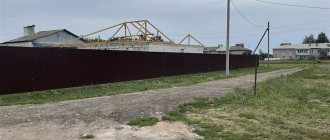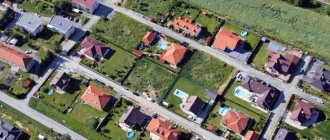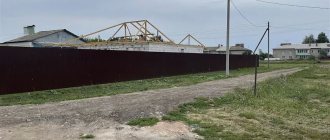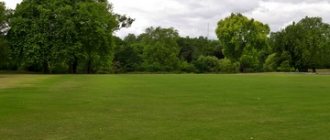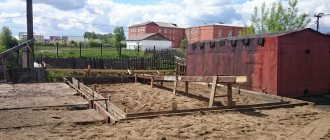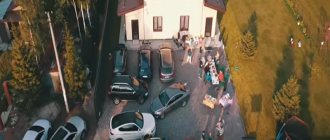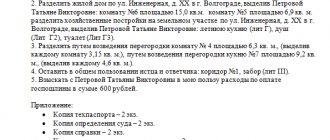Prices for legal services on land issues
How to formalize the squatting of land into ownership , what is squatting - our land law experts will answer these and other questions.
In the Russian Federation, all territories whose owner has not been determined are considered state. Therefore, by occupying a “nobody’s”, unused, seemingly abandoned plot, you may face fines and other unpleasant consequences. To avoid such situations, it is necessary to study information on how to legalize the squatting of a land plot.
Responsibility for squatting
State bodies monitor compliance with land legislation and the correct determination of the boundaries of plots used by owners and tenants. If an illegal seizure of land is detected, an act is drawn up, on the basis of which the violator can be held accountable.
Land squatting is considered an administrative offense (Article 7.1 of the Code of Administrative Offenses of the Russian Federation), for which a fine may be charged, calculated as a percentage of the cadastral value of the occupied territory. Both citizens and legal entities are recognized as violators.
Instructions for legalization
At the federal level, a law was adopted in 2004 that provides for the possibility of properly registering plots that have been seized. In this case, we are talking about dacha plots that are owned by the municipality or the state, and not by a private person. It turns out that the allotment should be used by only one person who actually owns it.
It is worth noting that such additional territories will have to be purchased from government agencies, but the price will be much lower than that set on the market.
How to find out the owner of a plot
In order to prevent conflict situations and the accrual of fines, it is worth trying to register ownership of a plot of land that is the object of squatting. To understand how to do this, you must first establish the owner.
The easiest way to find out whose ownership a plot is is by the cadastral number. It can be viewed on the Rosreestr website. You can carry out a search query using various parameters. If the site is located in SNT, its number can be obtained from the chairman of the board.
The next thing you need to do is submit a request to Rosreestr or MFC to provide information from the Unified State Register. The statement states:
- Details of the person requesting the information;
- Cadastral number (or a detailed description of the location of the site, its boundaries);
- The municipality on whose territory a piece of land is located.
You must pay a fee for obtaining information and attach a receipt to your application. The received certificate from the Unified State Register must contain information about who the owner is. Unfortunately, there will be no contacts there if the territory is private property. In SNT you can contact the chairman and ask him for channels for communication with the owner.
Grounds for refusal of state registration
Submitting documents for registration of a right does not mean that it will necessarily be registered. The applicant may be refused, in some cases. The reasons for this are as follows:
- documents are not prepared in accordance with current legislation;
- this land plot is the subject of legal proceedings regarding the establishment of legal boundaries;
- the register does not contain updated information about the boundaries of this land plot;
- there is a conflict between the already registered right and the one they are trying to register now;
- the completed documents do not contain all information about the applicant or the site, or the information provided is not true.
In order to register ownership of a plot of land that fits the category of squatting, you must contact a qualified specialist in St. Petersburg for legal services. Do not delay in submitting documents, as illegal use may lead to penalties.
Public lands in SNT
It will be possible to legitimize the seizure of public land in the SNT only if all the owners with a share agree with the provision of their part to someone alone. After receiving such consent (without exceptions, that is, unanimous), SNT should contact the administration with a request to withdraw the requested part of the territory from public use. When this happens, the buyer will decide on the acquisition of the newly formed cadastral unit with the administration.
It will be possible to register for membership in SNT after registering ownership rights.
If one of the owners, whose interests will be affected by the use of this common territory, does not agree with the sale, it will not be possible to legalize the squatting.
Registration procedure
The privatization process involves a preparatory stage, collection of relevant documentation and registration of rights to the site. The likelihood of a successful outcome of the case is reduced to zero if the second participant in the conflict makes efforts to defend his property. Otherwise, you can hope to obtain ownership rights.
ATTENTION! The likelihood of success increases if illegal buildings have not been erected on the land.
Preparation
Before submitting documents to the registration authority, you must:
- Establish the official owner of the allotment . If it cannot be found, it is necessary to register the land with the cadastral register. In this case, the privatization procedure can begin only after a year by purchasing the plot from the local authorities.
- Carry out land surveying if it has not been done previously. Despite the fairly high cost of the procedure, it is necessary because the cadastral plan is included in the list of documents required to register ownership.
The preparatory stage is necessary to establish the value of the site for further purchase and legal exploitation.
List of documents
To obtain a cadastral passport you will need:
- applicant's personal passport;
- title documents for the site;
- land surveying and geodesy plans;
- relevant petition;
- receipt of payment of state duty.
After the required document has been issued, you must submit to the registration authority:
- a corresponding petition (a sample can be found from employees);
- cadastral passport;
- the applicant's identity card (personal passport);
- a document confirming the option of obtaining land;
- check for payment of state duty;
- land title document obtained from the administration;
- information about the non-use or exploitation of the site before seizure, indicating the timing;
- decision of the visiting commission.
Where to contact
The circulation authority depends on the stage of registration of land rights.
- If a cadastral plan is required, you must contact the BTI and pay for the services of the appropriate specialist.
- To obtain ownership rights, you need to visit the land department of the local administration and submit an application.
- To register your rights to an allotment, you can contact Rosreestr or the territorial branch of the MFC with a list of necessary documents.
ATTENTION! Before contacting the registration authority, you must pay a fine in the prescribed amount for illegal exploitation of land and attach a confirming receipt.
It should be taken into account that obtaining rights to unauthorized occupied land is only possible if:
- the entire necessary list of documents is submitted, each of which complies with legal requirements;
- there is no legal proceedings to determine the boundaries of this site; there is a land surveying plan;
- there is no conflict with a third party claiming their rights to the allotment.
REFERENCE! The municipality's refusal to register land rights can only be appealed in court.
Deadlines
The period for obtaining land rights consists of the following periods:
- obtaining an extract from Rosreestr about the cadastral number of the plot (7 days);
- extract of title (2 weeks);
- drawing boundaries and obtaining a new cadastral number in case of its absence (14 days);
- the arrival of the visiting commission and receipt of its decision (this may take up to several months);
- Registration of property rights after submitting documents is carried out within 21 days.
Price
The amount of financial costs for obtaining land rights is not fixed and consists of the following factors:
- state duty (2 thousand rubles for individuals and 22 thousand rubles for legal entities);
- payment for the services of a cadastral engineer (depending on the region);
- payment of penalties.
It turns out that the price of privatization of squatting is from 2,000 to several tens of thousands of rubles.
Thus, the law allows the privatization of a plot obtained as a result of unauthorized occupation of the territory. But it is necessary to take into account the need to pay a fine and the procedure for obtaining property rights.
Self-occupation of state land
You can formalize the squatting of municipal land into ownership by submitting a corresponding request to the administration.
If the plot is not allocated and does not have a cadastral number, land surveying is first carried out at the expense of the buyer. The scheme and boundary plan of the land plot, together with a statement of request for registration of property, are sent to the administration, which will announce an auction after receipt of the application for purchase. If no more profitable buyers are found, the right to make the purchase will pass to the applicant. If the decision is positive, the administration will send a purchase and sale agreement to the applicant, which he can sign if he is satisfied with the conditions.
After paying the redemption amount, ownership must be registered through the registration chamber. This procedure will make it possible to finally legitimize the squatter.
The administration may refuse if:
- The illegally seized plot and the applicant’s own land belong to different territorial entities and belong to different categories of land;
- The requested territory is public land, or any communications are laid (or will be laid soon) under it;
- After merging with the requested plot, the owner’s land area will exceed the maximum size established by law;
- Lands are withdrawn from circulation or are not intended for the requested purposes, etc.
If the applicant considers the refusal to be unlawful, he can file a lawsuit. If a refusal is received, the illegal use will have to be stopped and the land plot vacated. There is no compensation for buildings already installed on it or improvement work carried out. The consequences that await the violator upon discovery of squatting may turn out to be much more unprofitable than the costs of registering property according to the law.
Author of the article
Dmitry Leonov
Work experience 15 years, specialization - housing, family, inheritance, land, criminal cases.
Author's rating
721
Articles written
712
about the author
Cost and terms of privatization of the site
Registration of the land on which a privately owned building is located is free of charge. In this case, you will only need to pay a state fee of 350 rubles.
Additional costs may arise when processing missing documents. For example, cadastral registration will cost a total of about 10,000 rubles.
The application for privatization is considered within 30 days. If you follow a simplified scheme, the period is reduced to two weeks. The period for registration of property rights is added to this period.
. This procedure will take approximately a week.
If cadastral registration and clarification of the boundaries of the land plot are required, the period will increase by another two weeks. However, this is an approximate time frame.
. If controversial situations arise, the registration process may drag on indefinitely.
If you have any questions or concerns, please seek legal advice. You can get free legal assistance on our website
. in a special window.
Land privatization in 2021 follows the same pattern as before. If you need advice on this issue, you can contact our lawyers – it’s free.
Land Use Basics
The principles and basic norms for the use of land plots are determined by the Land Code of the Russian Federation. Their main postulates are listed in Art. 1:
- the importance of land as the main component of life;
- the priority of its protection as an essential element of the environment and a means of production;
- the primacy of protecting human life and health;
- uniformity of fate of sites and related objects;
- payment for use;
- the right to participation of public and religious organizations, as well as individual citizens in resolving issues related to the implementation of their rights to land;
- the primacy of the conservation of especially valuable lands and protected areas;
- division according to intended purpose into categories>;
- equal respect for the legitimate interests of citizens and society.
How to legitimize squatting
This can be done subject to a number of conditions:
- the illegally occupied plot must correspond to the category of land of the owner’s main plot and be in use for more than 15 years;
- there should be no objections to the use of the land from local authorities and from neighbors;
- the size of the plot should not exceed the norm established in the region. If the standard in the region is not determined, then they will be allowed to annex no more than 10% of the size of the owner’s plot.
If you want to legalize unauthorized occupied space that meets the conditions listed above, you must consistently carry out the following actions:
- identify the owner of the illegally occupied land;
- enter into a contract or agreement with him to transfer ownership of it to you;
- carry out land surveying of the enlarged plot and establish its new boundaries, taking into account the additional area, followed by obtaining a new extract from the Unified State Register of Real Estate;
- register ownership of the united land.
If the house is captured
Are they prosecuted for seizing land or houses? The Code of Administrative Offenses affects actions relating only to a plot of land. The Criminal Code provides for liability for illegal entry in the absence of the consent of the resident.
If no one lives there, then the rules apply to evict a person who has not acquired legal grounds for living in the house. If an object is not put into operation, it cannot be considered acceptable for habitation and citizens are subject to eviction as if they were in an emergency or unfit for habitation.
Fine for unauthorized seizure of land
The amount of penalties imposed is influenced by two indicators:
- availability of information on the cadastral value of land ownership;
- the status of the offender is an individual, legal entity, or official.
In the absence of data on the cadastral valuation of the land, a fine is imposed in the following amount:
- citizens - 5,000 - 10,000 rubles;
- officials - 20,000 - 50,000 rubles.
The exact amount of the fine is determined by the court. In this case, various circumstances are taken into account, the main one of which is the amount of material damage caused to the owner of the land.
Was the Recording helpful? No 4 out of 4 readers found this post helpful.
Release of land
Municipal or land control authorities have the right to issue an order to clear a site from its property or illegal construction sites.
If the guilty person does not comply with the instructions and refuses to vacate the site, a lawsuit is filed in court. A decision is made obliging the authorities or the owner of the site, if it is a person or organization, to fulfill the requirements. The basis is the materials of the case on bringing to administrative responsibility. A civil lawsuit in court is the main threat to unauthorized occupation of a land plot.
Land rights
Before dealing with the responsibility for self-seizure of a land plot, you should find out what it is? Citizens have a whole list of rights to which they have the right to claim. This:
- rent;
- easement;
- inherited possession;
- own.
All of them are united by one factor - a legal basis. In all cases, there is either an agreement or a decision of the authorities on the transfer of the land plot. It may happen that decisions were made, but for some reason the registration of rights was not completed. People in our country, due to their negative attitude towards the state, tend to neglect formal rules. In cases of partial presence of a set of documents, liability for squatting of a land plot is not provided.
Instead of output
In order to enjoy the land with full rights, it must be registered in the cadastral register on time. It doesn’t matter which side you find yourself on - on the side of the victim or, on the contrary, you grabbed excess land - register what you are entitled to by law! And the sooner the better.
Sources
- https://pravovdom.ru/zemlya/otvetstvennost-za-samozaxvat-zemli.html
- https://zakon-navigator.ru/zakon-ot-16-09-2019-o-samozahvate-zemli-150-fz-kak-uzakonit-samozahvat-v-sobstvennost/
- https://georeestr.com/registratsiya-obektov/zemli-obshhego-polzovaniya.html
- https://ozhkh.ru/zemelnyj-uchastok/chto-takoe-samovolnyj-zahvat
- https://adm-pravo.ru/pravonarushenie/zemelnoe-i-lesnoe-zakonodatelstvo/zaxvat-zemli-obshhego-polzovaniya/
- https://geostart.ru/post/487
- https://urist.expert/pravonarusheniya/v-oblasti-ohrany-sobstvennosti/samovolnoe-zanyatie-zemli.html
- https://metrtop.ru/zemlya/nezakonniy-zahvat-zemli-obschego-polzovaniya/
[collapse]
Arbitrage practice
Currently, in the Russian Federation, judicial practice in this category of cases is quite widely developed. Seizures are committed by persons for various purposes, the main of which are the construction of country houses, housing and other buildings.
This problem is more acute for the Crimean Federal District. The regional authorities are taking measures to return illegally seized lands from the population. Also, by decision of the judicial authority, the demolition of illegally erected buildings is carried out.
Administrative sanctions
The norms of the Code of Administrative Offenses apply primarily to the invader. Firstly, they provide official confirmation of the fact of a violation of the law, and secondly, they serve as an incentive to correct the situation.
What fine is imposed on the violator? The calculations are based on the cadastral value of the land plot:
- citizens pay a fine of up to 1.5%, but not less than 5,000 rubles;
- officials of organizations pay a fine of 2%, but not less than 20,000 rubles;
- An organization responsible for unauthorized occupation of a land plot may pay a fine of at least 100 thousand rubles.
Is occupying an abandoned site considered squatting?
According to current legislation, it is forbidden to occupy areas where owners have not appeared for a long time.
It is believed that all abandoned sites have their owners, including heirs. After all, according to the law, if a person has accepted at least part of the inheritance, then everything else belongs to him.
That is, if a citizen took at least one of the things of the deceased, then he actually accepted the inheritance. This means that he owns all the abandoned areas, no matter where they are located.
But if there really are no heirs, then such property is considered escheat and passes to the state, which can sell the land at auction or auction.
